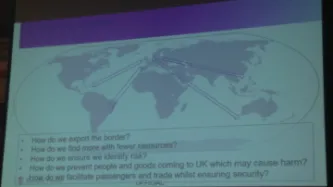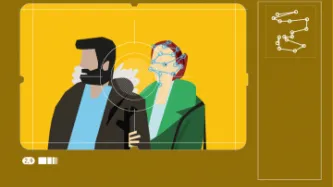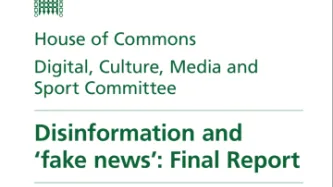Search
Content type: News & Analysis
Privacy International welcomes WhatsApp's immediate reaction after the revelation that Israeli cyber intelligence company NSO group had exploited a vulnerability in their software. We encourage all WhatsApp users to update their app as soon as possible. However, we believe WhatsApp needs to be much more transparent with their users. We haven't seen a notification on the app itself that would inform users about both, the bug, and the fix. The current version merely states that you can now see…
Content type: Examples
The DWP relies on anti-fraud officers who go and spy on benefit claimants to verify their claims. For instance, claimants who declare that they are a lone parent may end up with an officer trying to verify there is no one else living in the house. And once they are confident that the alleged lone parent is not actually single, their next step will be to find out if the other person is employed. In order to decide which household to target, the DWP relies on a “tip-off” system. People are in…
Content type: Examples
The surveillance of benefits claimants does not happen only online. In the UK, the Department of Work and Pensions (DWP) is known to be using CCTV footage of public buildings but also gyms and supermarkets to prove some benefits claimants are not actually disabled. Gym memberships are also being requested and an increasing number of private companies are being asked to send their footage for that reason.
https://www.theguardian.com/commentisfree/2018/may/31/benefits-claimants-fear-…
Content type: Examples
The rise of social media has also been a game changer in the tracking of benefits claimants. In the UK in 2019, a woman was jailed after she was jailed for five months after pictures of her partying in Ibiza emerged on social media. She had previously sued the NHS for £2.5 million, after surviving a botched operation. She had argued the operation had left her disabled and the “shadow of a former self” but judges argued that the pictures suggested otherwise.
https://www.dailymail.co.uk/news/…
Content type: Examples
In London, four boroughs have been trialling the London Counter Fraud Hub. The hub is designed to process huge quantities of data from millions of household to detect certain types of fraud involving the single person council tax discount (in London, a person living alone gets a reduced rate on their council tax), the subletting of local authority housing and the business relief and rating. With a 20% error rate, it means thousands of households will receive letters wrongly suspecting them of…
Content type: News & Analysis
The first half of 2018 saw two major privacy moments: in March, the Facebook/ Cambridge Analytica scandal broke, followed in May by the EU General Data Protection Regulation ("GDPR") taking effect. The Cambridge Analytica scandal, as it has become known, grabbed the attention and outrage of the media, the public, parliamentarians and regulators around the world - demonstrating that yes, people do care about violations of their privacy and abuse of power. This scandal has been one of…
Content type: Advocacy
In December 2018, PI responded to the UK Information Commissioner's (ICO) Call for Views on a Code of Practice for the use of personal information in political campaigns.
The consultation followed on from the ICO's policy report Democracy Disrupted?, published in July 2018, which recommended that the Government should legislate at the earliest opportunity to introduce a statutory Code of Practice under the Data Protection Act 2018 for the use of personal information in campaigns.…
Content type: News & Analysis
This piece was first published in GDPR today in March 2019.
Elections, referendums and political campaigns around the world are becoming ever more sophisticated data operations. This raises questions about the political use and abuse of personal data. With the European Union elections fast approaching and numerous national and local elections taking place across EU Member States, it is essential that the legal frameworks intended to protect our personal data do just that.
Member State…
Content type: Advocacy
This week a public debate on facial recognition will take place in Westminster Hall.
Following a public request for comment by Darren Jones MP (Science and Technology Committee), we sent our responses to the questions asked.
Below you can find the integral content of our letter.
1. Would you consent to the police scanning your face in a crowd to check you’re not a criminal?
Facial recognition technology uses cameras with software to match live footage of people in public with…
Content type: Examples
On January 9, 2019 the UK Information Commissioner's Office fined SCL Elections, also known as Cambridge Analytica, £15,000 for failure to comply with an enforcement notice the ICO issued in May 2018 ordering the company to respond in full to a subject access request submitted by US-based academic David Carroll. The company was also required to pay £6,000 in costs and a victim surcharge of £170. Information Commissioner Elizabeth Denham noted that UK data protection laws apply to all data…
Content type: Examples
Despite Facebook's October 2018 rules intended to provide greater transparency about political ads, the sources of funding for UK political ads remained obscure in early 2019. when a network of hard-Brexit and people's vote campaigning groups spent more than £1 million on Facebook ads in the lead-up to the crucial Parliamentary vote. For a week in January 2019, the biggest UK political advertiser on the service was Britain's Future, an obscure pro-Brexit group that spent £31,000 in that single…
Content type: Examples
The results of a year-long review issued by the UK Information Commissioner's Office in November 2018 uncovered a "disturbing disregard for voters' personal privacy" on the part of 30 organisations, including social media platforms, political parties, data brokers, and credit reference agencies. Based on information uncovered during the investigation, the ICO sent 11 warning letters requiring action by the main political parties, and announced its intention to conduct audits; issued an…
Content type: Examples
In 2019, a prominent page on the Facebook Business site cited the British Conservative Party as a "success story" at the 2015 general election, which put the party into power with a narrow majority. The site boasted that via Facebook the Conservatives had an 80.6% reach in key constituencies, 3.5 million video views, and a social context for 86.9% of all the ads served - and that as a result the party had defied the polls and achieved an outright majority.
https://en-gb.facebook.com/business/…
Content type: Examples
In November 2018, the UK government announced that 11 local authorities across England would participate in Voter ID pilots in the interest of gaining "further insight into how best to ensure the security of the voting process and reduce the risk of voter fraud". Five local authorities participated in pilots in the 2017 general election. The new pilots will test four models of identification checks: photo ID (Pendle, East Staffordshire, Woking), photo and non-photo ID (Ribble Valley, Broxtowe,…
Content type: Long Read
(In order to click the hyperlinks in the explainer below, please download the pdf version at the bottom of the page).
Content type: Long Read
The UK border authority is using money ring-fenced for aid to train, finance, and provide equipment to foreign border control agencies in a bid to “export the border” to countries around the world.
Under the UK Border Force’s “Project Hunter”, the agency works with foreign security authorities to bolster their “border intelligence and targeting” capabilities with UK know-how and equipment.
As well as the provision of equipment and training, the Border Force is also advising countries on…
Content type: Long Read
(In order to click the hyperlinks in the explainer below, please download the pdf version at the bottom of the page).
Content type: Long Read
(In order to click the hyperlinks in the explainer below, please download the pdf version at the bottom of the page).
Content type: Long Read
(In order to click the hyperlinks in the explainer below, please download the pdf version at the bottom of the page).
Content type: Long Read
(In order to click the hyperlinks in the explainer below, please download the pdf version at the bottom of the page).
Content type: Advocacy
In October 2018, Privacy International submitted to the public consultation on the “Consolidated Guidance to Intelligence Officers and Service Personnel on the Detention and Interviewing of Detainees Overseas, and on the Passing and Receipt of Intelligence Relating to Detainees” (“Consolidated Guidance”) held by the Investigatory Powers Commissioner’s Office (“IPCO”).
Privacy International’s submission addresses the portions of the Consolidated Guidance on “the Passing and…
Content type: Long Read
(In order to click the hyperlinks in the explainer below, please download the pdf version at the bottom of the page).
Content type: News & Analysis
Privacy International welcomes the focus on data and privacy contained in the final report by the UK House of Commons Digital, Culture, Media and Sport Committee (DCMS) on Disinformation and ‘fake news’. Beyond our control, companies and political parties have banded together to exploit our data. This report establishes essential steps to remedying this downward spiral. An important part of the democratic process is freedom of expression and right to political participation, including the right…
Content type: Long Read
UPDATED 11TH JUNE 2019: We've just launched our campaign, and you can now write to your local PCC easily using the online portal we have created with Liberty.
(In order to click the hyperlinks in the explainer below, please download the pdf version at the bottom of the page).
Content type: Examples
A flaw in the official 2018 UK Conservative Party conference app granted both read and write access to the private data of senior party members, including cabinet ministers, to anyone who logged in by second-guessing the email address they used to sign into the app. Twitter users claimed that one leading politician, Boris Johnson, had his avatar briefly replaced by a pornographic image, while another, Michael Gove, had his replaced by that of media magnate Rupert Murdoch. The app was…
Content type: Long Read
The Privacy International Network is celebrating Data Privacy Week, where we’ll be talking about how trends in surveillance and data exploitation are increasingly affecting our right to privacy. Join the conversation on Twitter using #dataprivacyweek.
In the era of smart cities, the gap between the internet and the so-called physical world is closing. Gone are the days, when the internet was limited to your activities behind a desktop screen, when nobody knew you were a dog.
Today, the…
Content type: News & Analysis
Privacy International welcomes the judgment of the European Court of Human Rights in Catt v the United Kingdom.The Court found that the UK violated the right to privacy (Article 8 of the European Convention on Human Rights) of Mr John Catt, a peace movement activist, who despite having never being convicted of any offence, had his name and other personal data included in a police database known as the “Extremism Database”. The Court found problematic "the variety of definitions of…
























